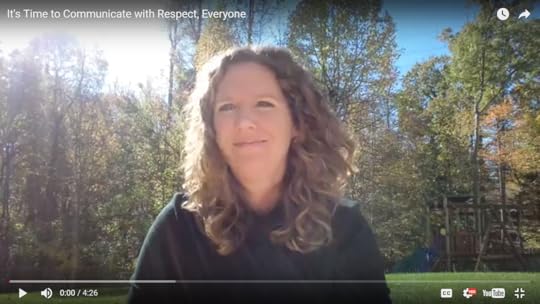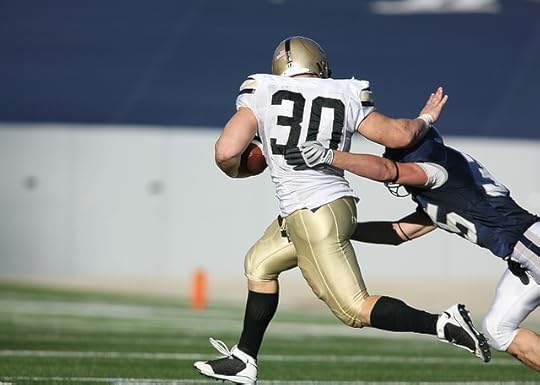Kris Spisak's Blog, page 33
November 23, 2016
Writing Tip 196: “Bird” vs. “Fowl”


It’s a bird! It’s a plane! It’s a fowl?
Every year around Thanksgiving, someone usually asks me, “What is the difference between ‘bird’ and ‘fowl’?” And it’s finally time to address it in writing.
“Fowl” comes from the from the Old English word fugel, which is related to the Latin word flēogan, which means to fly. A long time ago, “fowl” was used to represent birds of any kind, and this usage still sneaks out today; however, most sources seem to agree that there is a difference between these two words.
“Fowl” is used to refer to waterfowl, such as ducks, swans, and geese; game fowl, such as turkey or pheasant; or domesticated barnyard birds like chickens. In the food industry, “fowl” is often used to reference birds that are commonly eaten or the meat of these birds in a way that’s synonymous with “poultry.”
“Birds” are any members of the animal class Aves. They are warm-blooded, lay eggs, have feathers, and usually fly.
Thus, that Thanksgiving turkey is both a fowl and a bird, but that songbird outside your window is a bird, most likely not a fowl. Unless you have a singing chicken, which would be pretty cool and perhaps the inspiration for a new animated film. That animated film’s name could be “Fowl,” which could be a fun play on the word “foul,” which would most likely be a good descriptor of the animal’s singing voice. (For more details on this pair, see Get a Grip on Your Grammar).
I hope this solves it for you! If you have any other word usage quandaries, let me know.
Sign-up for my writing tips email newsletter for more tips like these.
The post Writing Tip 196: “Bird” vs. “Fowl” appeared first on Kris Spisak.
November 16, 2016
Writing Tip 195: “Rye” vs. “Wry”


Fields of Rye, not Wry… though I think we might have stumbled upon a brilliant name for a comedy club in the midwest.
I’m not sure what it would mean if someone had a rye sense of humor. Maybe it’s as refreshing as a breeze through the stalks of rye fields.
Conversely, if we’re talking about “wry bread,” I’m a bit fascinated. This bread talks? And it sounds quite intelligent. Wherever did you find it?
Of course, neither of these are probably what you mean to be saying.
Remember:
“Wry” is an adjective, meaning humorous in a dry, sarcastic, mocking, ironic, or perverse way.
“Rye” is a grain, best known for its use in making rye bread or rye whiskey.
I’m still fascinated by that bread, though. Does the wry bread have a rye sense of humor? Are it’s jokes just delicious?
Oh, simple typos can make my imagination run wild.
The post Writing Tip 195: “Rye” vs. “Wry” appeared first on Kris Spisak.
November 14, 2016
Politics, Anagrams & Predictions

These days, there’s a lot of talk about politics, and if we meet over a drink I’ll have that conversation with you. But today, I want to take a step back to a political era of long ago.
 Did you know that King Louis XII of France had a Royal Anagramist? Yes, an “anagramist.” Anagrams, or words created by rearranging the letters of a first word, were thought to be mystical in his time, not just word games. In fact an anagram of someone’s name was thought to have predictive properties about their character, their motives, and their destiny. Coolest job ever? Definitely in the running…
Did you know that King Louis XII of France had a Royal Anagramist? Yes, an “anagramist.” Anagrams, or words created by rearranging the letters of a first word, were thought to be mystical in his time, not just word games. In fact an anagram of someone’s name was thought to have predictive properties about their character, their motives, and their destiny. Coolest job ever? Definitely in the running…
Are you suddenly working on anagrams of the names of your favorite or least favorite politicians? If you have some time on your hands, have fun with that. I will give you a starting point.
Rearrange “George Bush” and you have “He Bugs Gore.” Interesting (or at least funny), no?
Some of my favorite anagrams include:
“The Eyes” –> “They See”
“Astronomer” –> “Moon Starer”
“William Shakespeare” –> “I’ll Make a Wise Phrase”
“Clint Eastwood” –> “Old West Action”
“Statue of Liberty” –> “Built to Stay Free”
I tried it out on my own name. The best I could come up with: “Kris Spisak” rearranges to “I kiss parks.”
I do love the outdoors. Some people hug trees. My name makes me destined to kiss parks? There could be worse things, I suppose. I don’t know what this says about my character or destiny. Where is old Louis’s anagramist when I need him? Oh never mind, let me find a good hiking trail and see what happens.
In further anagram trivia:
There is no other word that can be made by rearranging the letters of “anagram.”
Try it. I dare you.
How’s this for a distraction from today’s politics? Knowing history helps prevent you from making yesterday’s mistakes, after all. I’m glad it’s settled that we shouldn’t spend tax dollars on a national anagramist. Okay, get back to changing the world, everyone. Just try to do so with a focus on respect.
Stay tuned for more next week.
Sign-up for my writing tips email newsletter for more tips like these.
The post Politics, Anagrams & Predictions appeared first on Kris Spisak.
November 12, 2016
It’s Time to Communicate with Respect, Everyone (Video)

Approximate transcript:
Hi, everyone. I’m Kris Spisak. I’m an author and an editor, and today, I have something to say.
At different points in world history, the writers among us have picked up our quills, our papyrus, our scrolls, our pens, and our keyboards, because something needs to be said. But you know what’s awesome about this moment in history? We are all writers.
Let that sink in for a moment.
We write notes to our kids, emails, social media posts… We do so much more writing than at any other time in the history of the world, so we need to take advantage of that and focus on respect.
Aretha Franklin sang “R-E-S-P-E-C-T,” and, you know what, she can do that so much better than me. But we need to take that message to heart. Communicate with respect. We’ve been a bit reckless lately.
When it comes to your actions, your momma taught you so much better than what I’m seeing in the world lately. And if she didn’t, it’s time to step it up a notch. But right now, I’m talking about simply about words.
You don’t talk to your boss like that, do you? Your neighbors? Your kids? No! You know what respect is. High five!
But, if you know what respect is, why are words crumbling to the ground right now? You can do better.
If you are unfazed by all of the hatred in the world today, open up your eyes. It is not good for any of us. No one is winning with hatred.
Anger needs to be redirected into passion; passion needs to be redirected into action–whether you’re writing a manifesto, the next great American novel, that next social media post, or you’re putting your boots to the ground becoming the change you want to see in the world. This is a familiar concept, but right now, it’s going past a lot of people.
Sure, words themselves are admittedly not always nice to one another. This is where the editor in me thinks of a word like “go” that hijacked its past tense from a whole other word, and that’s why “go” and “went” have nothing in common with each other. But we’re not talking about words and editing today.
Whether it’s a discussion of fewer votes, whose fantasy football quarterback is better, or who said what to whom and when and how, we need to use our words. This reoccurring use of our words for anger and hatred accomplishes nothing.
When I spend my days as an editor in the trenches, worrying about word choice, grammar, and punctuation, it seems sometimes a bit small. But what could be more important than communicating clearly, concisely, and with respect to make change in the world–be it a little change in your office, a change in your peer group, a change for your family, or a change for the nation?
Use your words like you’ve been told since you were two years old. Use your words, and use them well.
I want to go further than this, but I won’t.
Generations of little girls in the United States have sung Aretha Franklin’s “Respect” at the top of their lungs at sleepovers and at middle school dances. And you know what? If that’s not your childhood, your gender, your cultural heritage, that is okay.
What is important here is that level of respect. What matters is that the words we use elevate our world and make a difference. Our words should be the beginning of a change we want to see. They should not be tearing people or the world apart.
It’s hard. I get that. When we’re angry, when we’re passionate about something, it’s hard not to add ten gazillion exclamation points and emoticons and swear words. I get that.
We have to redirect that energy, turn it into passion not anger, and turn it into action. Communicate with respect. We all have to try.
Sign-up for my writing tips email newsletter for more tips like these.
The post It’s Time to Communicate with Respect, Everyone (Video) appeared first on Kris Spisak.
November 9, 2016
Writing Tip 194: “Reckless” vs. “Wreckless”


I don’t know if this pilot was being reckless, but I do know that he isn’t wreckless.
When you drive, which one of these should you aspire to? Which one should you avoid? Ignoring the fact that only one of these is a real word, I think logic directs you to one side rather than the other.
Hint: a police officer might pull you over for reckless driving, but if you’re a wreckless driver, you won’t have any points taken off of your record.
Remember:
“Reckless” is to be careless or unconcerned with the consequences.
“Wreckless,” I suppose, would be to have an absence of collisions, but—again—it isn’t a real word.
While the difference is only a matter of a “w,” the roots of the core of these words—“reck” and “wreck”—come from different directions. “Reckless” traces back to the Old English rēcan and earlier form reccan, which which means to care. “Reck” isn’t a word we use today, but this absence of care is clear in the “reckless” form we well know.
“Wreck” comes from the Old English wrecan, which meant to punish or avenge.
Interestingly, Beowulf included both forms, reccan and wrecan. They are indeed different and continue to be so today.
Whether you’re feeling like a wreck or not, being reckless can have unintended consequences—when you’re being so in your writing or otherwise. Not fazed? Maybe you should be.
The post Writing Tip 194: “Reckless” vs. “Wreckless” appeared first on Kris Spisak.
November 7, 2016
The Origin & Value of “Look Before You Leap”


“Look before you leap” is first known to appear in this 14th century
Manuscript (Ms. Douce)
now housed in the Bodleian Library, at Oxford.
Today, like so many days, I urge you to look before you leap.
Maybe it’s a matter of what you choose for breakfast. Maybe it’s what you decide to speak up about to your boss. Maybe it’s a matter of who you decide to vote for.
We make so many decisions big and small on a daily basis, but they can’t all be taken lightly. We can’t just eat our Wheaties because that’s what everyone else is eating or because someone who may or may not have been fully trustworthy told us that this was the best choice for our future health.
Look before you leap, people.
Its all about thinking, paying attention, and taking on the world in a way where the world won’t drop out under your feet.
Of course, the phrase “look before you leap” goes as far back as at least 1350 (see the illuminated manuscript at the right). It’s first English citation is an a collection of proverbs by John Heywood in 1546, and it’s first use in the United States was in 1677 in the History of Indian Wars in New England.
It’s a saying that has been around for a long time and for good reason.
Etymology aside, “look before you leap” is a valuable expression–one you should embody with every important choice you make in your life. Your landings will prove much kinder that way. At least, that’s my two cents.
References:
“English Illuminated Manuscripts.” Web Gallery of Art. Accessed November 6, 2016. http://www.wga.hu/html_m/zgothic/miniatur/1301-350/1english/
Titelman, Greogory Y. Random House Dictionary of Popular Proverbs and Sayings. New York: Random House Reference, 1996.
The post The Origin & Value of “Look Before You Leap” appeared first on Kris Spisak.
November 1, 2016
Writing Tip 193: “Bye” vs. “By” vs. “Buy”


Not on a bye, this guy’s saying “buh-bye” as he runs right by. Maybe he’ll dance to NSYNC in his head when he does his touchdown dance before he buys tickets to Disney World.
Let’s go beyond the double-negative in NSYNC’s lyrics about “it ain’t no lie,” and talk about “bye,” “by” and “buy.”
Remember:
“Bye,” short for “good-bye,” is a word used when separating from someone. For example, NSYNC said “bye” multiple times for emphasis to prove that they really were walking away from someone. A “bye” is also a situation where a single competitor or a team is able to move forward while skipping a game that others have to play. For example, the quarterback on my fantasy football team had a bye, so I scrambled to find a replacement.
“By” is a preposition commonly referring to position, specifically connected with proximity; timing, in a way similar to “before”; and dimensions, as in a two by four plank or grid.
To “buy” is to purchase or to believe. For example, you could buy tickets or buy into the boy-band craze.
NSYNC did perform along with Aerosmith, Mary J. Blige, Britney Spears, and Nelly at the 2001 Superbowl Halftime show in which no one had a bye, but I bet the admission for that night was pretty pricey to buy. And I’m not going to talk about Justin Timberlake’s other Superbowl appearance. Personally, I wish he had a bye for that one.
The post Writing Tip 193: “Bye” vs. “By” vs. “Buy” appeared first on Kris Spisak.
October 25, 2016
Writing Tip 192: “Waste” vs. “Waist”


Here’s a waste that will go straight to your waist (and might leave you slightly nauseated).
It really is a waste if all you can think about is your waist. There are so many better things in the world to think about than something so vain—like kindness, like love, like Shakespeare’s potential co-authors, or even your word choice, for example.
You might have your own waste management practices that include recycling and composting, or you might have your waist management practices which involve sit-ups and some cardio. How are you doing with yours? Actually, don’t answer that. It’s not the point of this conversation. What is important is how you spell these words.
Remember:
“Waste” can be trash or unused surplus, when it’s a noun. As a verb, it has multiple definitions, including to throw away, be done with, or ignore something when there is still potential value, as well as to squander, to spoil, or to wear down.
A “waist” is the part of your body between your ribs and your hips.
Obsessing over either is a hard path to walk, but obsessing over their spelling is absolutely manageable.
Happy writing, all!
The post Writing Tip 192: “Waste” vs. “Waist” appeared first on Kris Spisak.
October 18, 2016
Writing Tip 191: “Another Think Coming” vs. “Another Thing Coming”


There was a time climbing seemed like a good idea, but if this guy thinks he’s getting down easily, he’s got another think coming.
President Obama has gotten it wrong. Judas Priest has gotten it wrong. Your friends have gotten it wrong on social media (or at least mine have). Do you know the correct version of this idiom?
While “you’ve got another thing coming” might sound better to your ear, the expression is actually “you’ve got another think coming.” As in, “if that’s what you think, you’ve got another think coming.”
Does the correct version make a noun-fussy grammarian shudder? Perhaps. But this correct form dates back at least to the early 1910s and possibly before.
To be fair, the Oxford English Dictionary has been correcting people about this eggcorn since 1919—though it wasn’t until the 1980s that mass confusion seemed to have set in. I’m looking at you, Judas Priest.
Meanwhile, how fun is it to connect Barack Obama to Judas Priest? No seven degrees of separation needed thanks to “another think coming” vs. “another thing coming.” You’re welcome.
The post Writing Tip 191: “Another Think Coming” vs. “Another Thing Coming” appeared first on Kris Spisak.
October 12, 2016
Writing Tip 190: “Frankenstein” vs. “Frankenstein’s Monster”

 You can definitely blame Hollywood for the confusion that’s become commonplace around Mary Shelly’s famous monster. Bookish types and horror aficionados are particular on this point, so it’s time you know the truth.
You can definitely blame Hollywood for the confusion that’s become commonplace around Mary Shelly’s famous monster. Bookish types and horror aficionados are particular on this point, so it’s time you know the truth.
In the 1818 novel Frankenstein, the creature didn’t have a name. It was referred to as the “monster,” “creature,” “wretch,” and just plain old “it.” With a lack of a name or identity, it’s understandable why the creation was so mad. The creature also was significantly more self-aware and verbal in the book than Hollywood’s typical representation. He had intelligent dialogue far more than the groans and grunts he normally sticks to in movie form.
As for “Frankenstein,” this was the name of the creator, Dr. Victor Frankenstein. “Frankenstein’s monster” would technically be the correct way to refer to the monster.
The problem is, though, that after over a century of film adaptations, “Frankenstein” has become generally accepted as a reference to both the scientist and the monster. So, use it as you’d like, but be aware that you might be called out for it.
In other Frankenstein trivia:
Did you know that this horror classic was written by not only a woman, but the daughter of early feminist Mary Wollstonecraft?
Did you know it was written for a fiction competition among friends to see who could write the scariest story?
Did you know that there is a Castle Frankenstein in Germany that most-likely inspired the famous name?
Did you know that Thomas Edison was the producer of the first ever Frankenstein movie, which was released in 1910?
Did you know that an awesome Halloween costume for a guy named Frank is to walk around with a beer stein all night? (Get it?)
Enjoy your horror books and horror movies on dark spooky nights, everyone. Just make sure you know what you’re talking about!
The post Writing Tip 190: “Frankenstein” vs. “Frankenstein’s Monster” appeared first on Kris Spisak.



